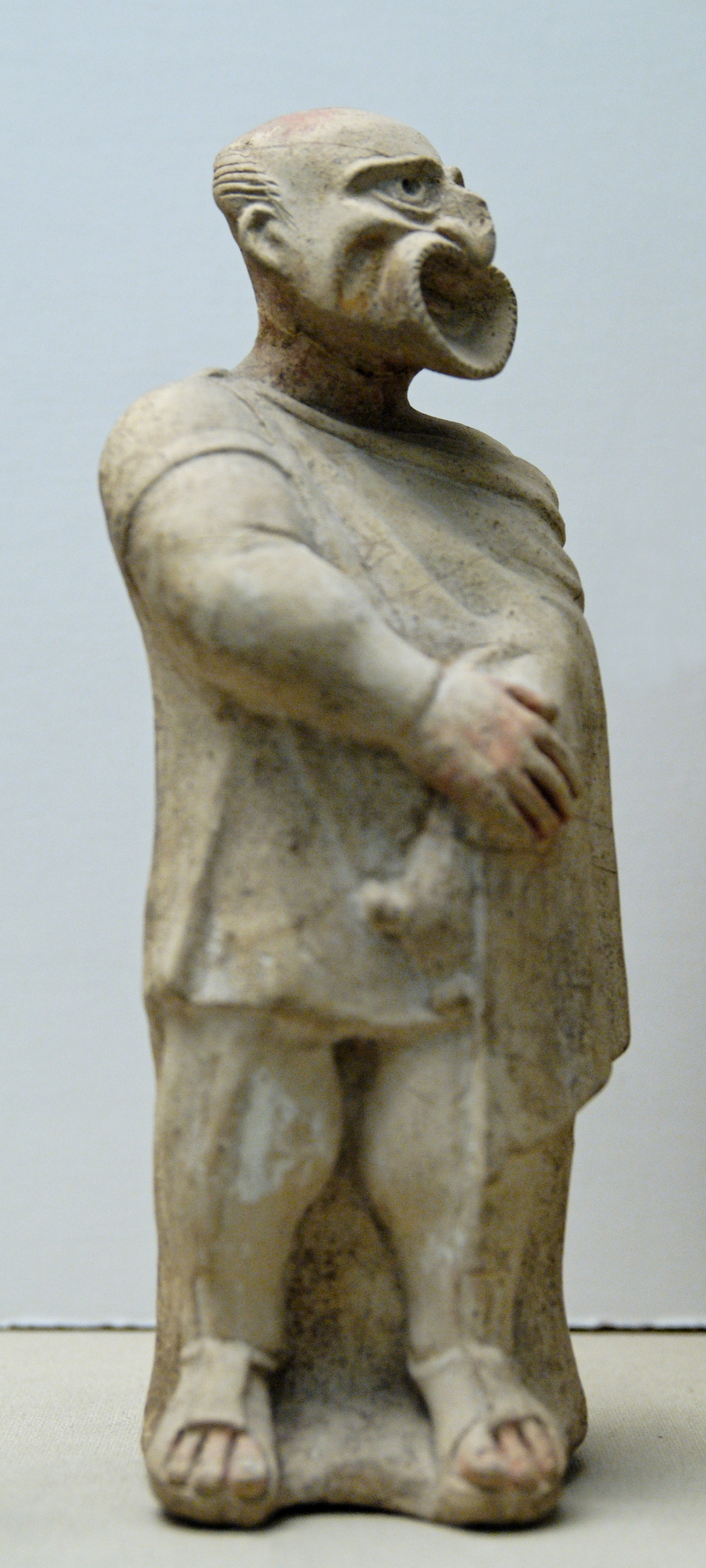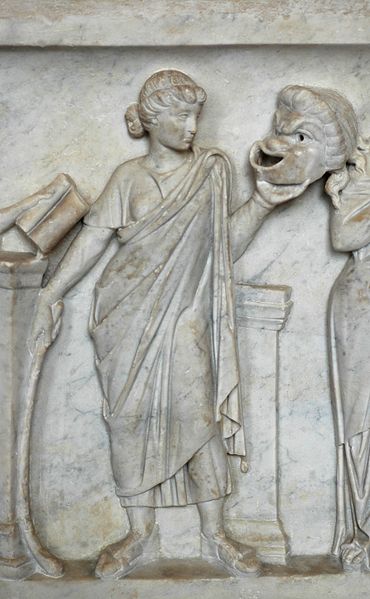skip to main |
skip to sidebar
UNDER CONSTRUCTION: "Eliminationism" In Politics
 Actor wearing the mask of a bald-headed politician, 2nd century BC.
The philosopher Aristotle wrote in his Poetics (c. 335 BC) that "comedy is a representation of laughable people and involves some kind of blunder or ugliness..."
Actor wearing the mask of a bald-headed politician, 2nd century BC.
The philosopher Aristotle wrote in his Poetics (c. 335 BC) that "comedy is a representation of laughable people and involves some kind of blunder or ugliness..."
 Thalia, muse of comedy, gazing upon a comic mask (detail from Muses' Sarcophagus)
Thalia, muse of comedy, gazing upon a comic mask (detail from Muses' Sarcophagus)
 Strepsiades, his son and Socrates (from a 16th Century engraving).
Faced with legal action for non-payment of debts, Strepsiades, an elderly Athenian, enrolls his son in The Thinkery (the "Phrontisterion") so that he might learn the rhetorical skills necessary to defeat their creditors in court. The son thereby learns cynical disrespect for social mores and contempt for authority and he subsequently beats his father up during a domestic argument, in return for which Strepsiades sets The Thinkery on fire.
Strepsiades, his son and Socrates (from a 16th Century engraving).
Faced with legal action for non-payment of debts, Strepsiades, an elderly Athenian, enrolls his son in The Thinkery (the "Phrontisterion") so that he might learn the rhetorical skills necessary to defeat their creditors in court. The son thereby learns cynical disrespect for social mores and contempt for authority and he subsequently beats his father up during a domestic argument, in return for which Strepsiades sets The Thinkery on fire.
 Soldier loads a "leaflet bomb" during the Korean war.
Soldier loads a "leaflet bomb" during the Korean war.
 Poster promoting eugenics and euthanasia of disabled people.
Poster promoting eugenics and euthanasia of disabled people.


 "Eliminationism" claims a moral purpose, holding that political opponents are "a cancer on the body politic that must be excised—either by separation from the public at large, through censorship, or by outright extermination—in order to protect the purity of the nation." Joshua Holland, Dave Neiwert on the Roots of Right-Wing Terror
"Eliminationism" claims a moral purpose, holding that political opponents are "a cancer on the body politic that must be excised—either by separation from the public at large, through censorship, or by outright extermination—in order to protect the purity of the nation." Joshua Holland, Dave Neiwert on the Roots of Right-Wing Terror
 Actor wearing the mask of a bald-headed politician, 2nd century BC.
The philosopher Aristotle wrote in his Poetics (c. 335 BC) that "comedy is a representation of laughable people and involves some kind of blunder or ugliness..."
Actor wearing the mask of a bald-headed politician, 2nd century BC.
The philosopher Aristotle wrote in his Poetics (c. 335 BC) that "comedy is a representation of laughable people and involves some kind of blunder or ugliness..."
 Thalia, muse of comedy, gazing upon a comic mask (detail from Muses' Sarcophagus)
Thalia, muse of comedy, gazing upon a comic mask (detail from Muses' Sarcophagus)
 Strepsiades, his son and Socrates (from a 16th Century engraving).
Faced with legal action for non-payment of debts, Strepsiades, an elderly Athenian, enrolls his son in The Thinkery (the "Phrontisterion") so that he might learn the rhetorical skills necessary to defeat their creditors in court. The son thereby learns cynical disrespect for social mores and contempt for authority and he subsequently beats his father up during a domestic argument, in return for which Strepsiades sets The Thinkery on fire.
Strepsiades, his son and Socrates (from a 16th Century engraving).
Faced with legal action for non-payment of debts, Strepsiades, an elderly Athenian, enrolls his son in The Thinkery (the "Phrontisterion") so that he might learn the rhetorical skills necessary to defeat their creditors in court. The son thereby learns cynical disrespect for social mores and contempt for authority and he subsequently beats his father up during a domestic argument, in return for which Strepsiades sets The Thinkery on fire.
 Soldier loads a "leaflet bomb" during the Korean war.
Soldier loads a "leaflet bomb" during the Korean war.
 Poster promoting eugenics and euthanasia of disabled people.
Poster promoting eugenics and euthanasia of disabled people.






No comments:
Post a Comment